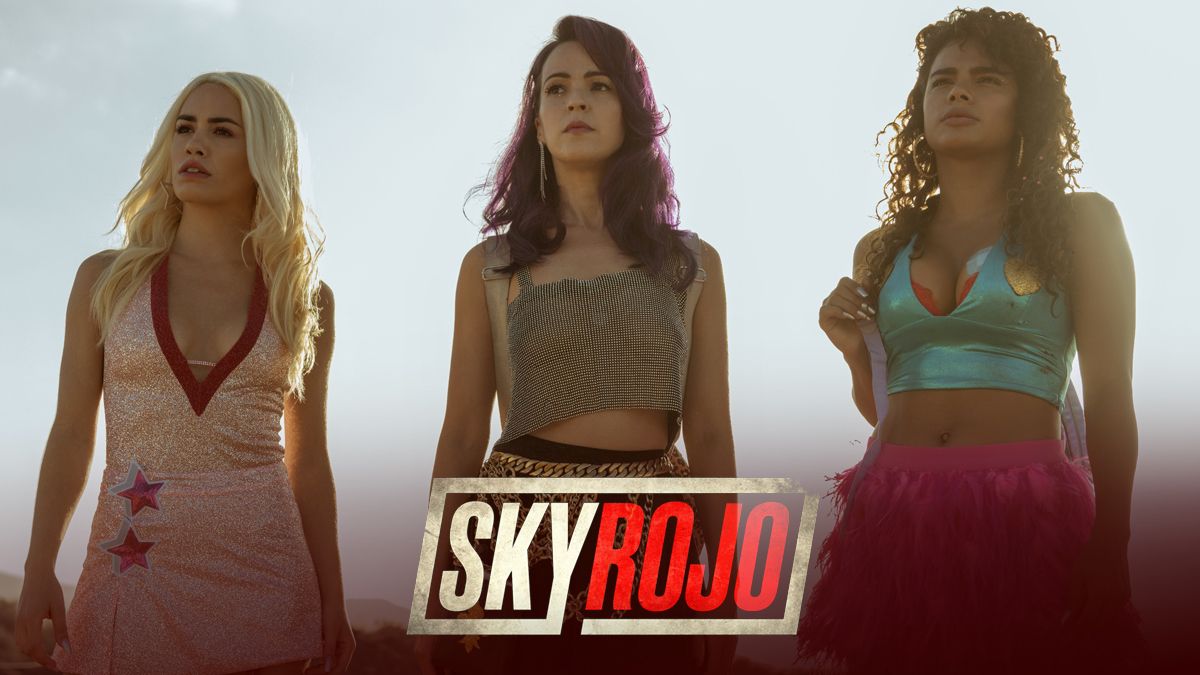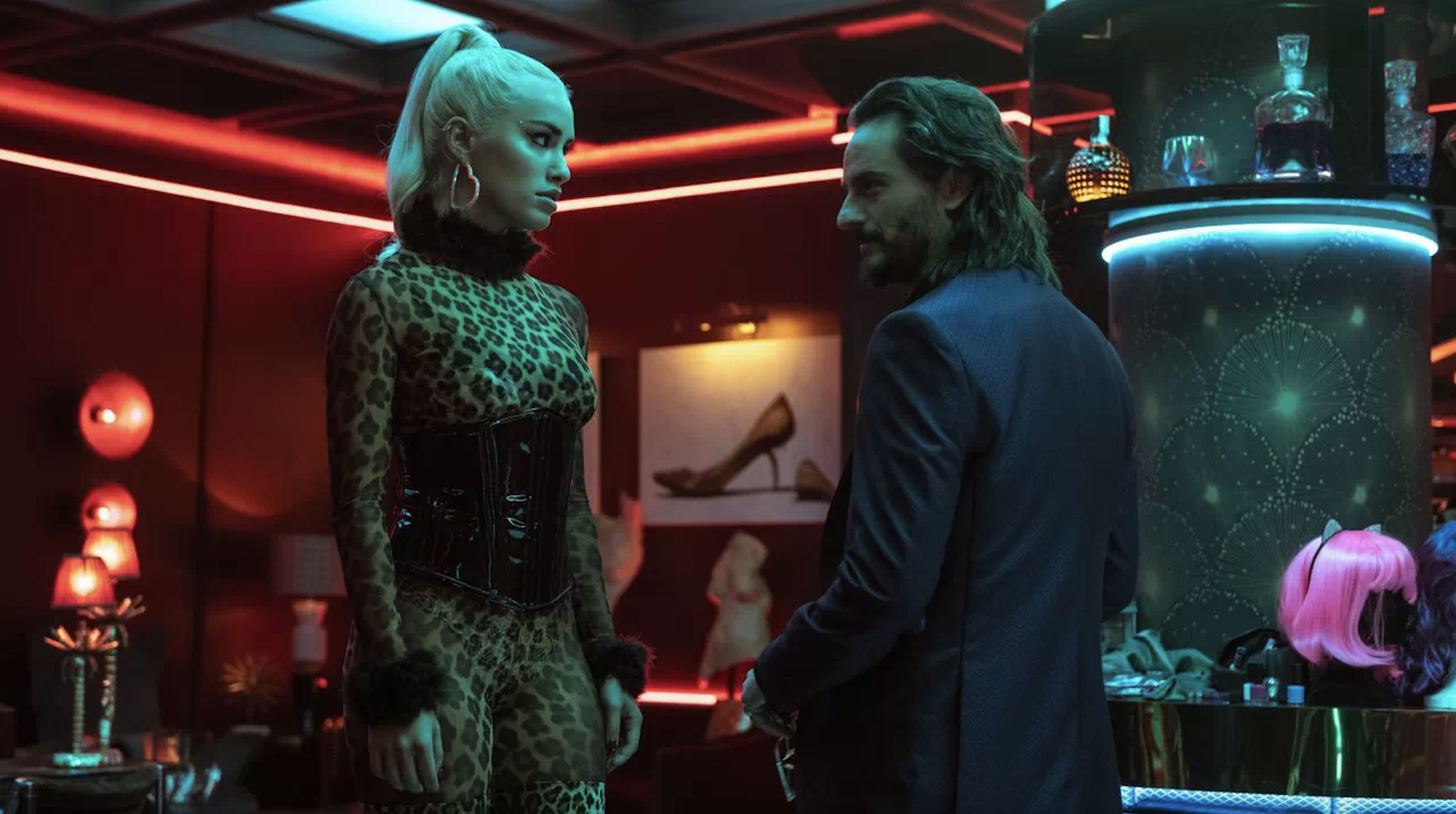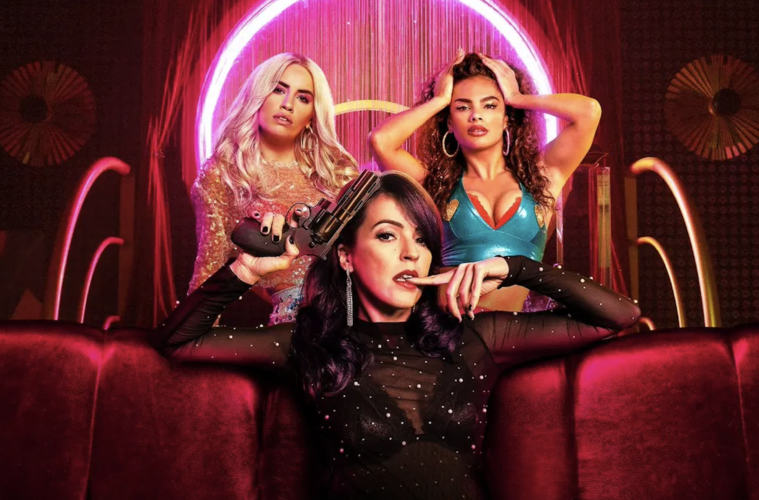Sky Rojo is the latest series made by the creator of Money Heist (‘La Casa de Papel’), Alex Pina, together with Esther Martínez Lobato. The narrative is weaved smoothly and organically, and it is just as thrilling as Money Heist, or even more because of its shorter episodes, so it will surely keep you on the edge of your seat throughout. It might be hard to watch, however, with its core theme being sexual exploitation and trafficking, but it is definitely worth it and entertaining. Don’t be surprised if you binge it in one evening.
★★★★☆

Wendy, Coral, and Gina (Sky Rojo, Netflix).
The series’ first season is set in ‘Las Novias Club’, in Tenerife, the Spanish island next to Africa, where three prostitutes escape their oppressive brothel after they get into an intense and messy fight with their exploiter. Coral, the protagonist, gives us a voiceover retelling of the events, just as Pina did with Money Heist, narrated by Ursula Corberó’s captivating and complicated character, Tokio. It’s safe to assume that Coral also managed to fascinate the audience since Netflix already announced the debut of its second season on the upcoming July 23rd.
The pilot’s climax occurs when Gina, another one of our three protagonists, has a meeting with their pimp, Romeo, to tell him that she finally finished paying her debt to him of thousands of euros. Thus, she now wants to leave and return to her country and her family, including her infant son. In this emotional scene, the audience may feel thrilled that Gina will be able to escape her reality until Romeo crushes her hope by telling her that in the period she was saving to pay her original debt, she accumulated an even bigger one. Simply put, the system he incarcerated the women in, did not allow for them to be able to leave it.
As Romeo puts it, Coral’s persona inside the club represents sophistication, Gina’s represents innocence, and Wendy’s, our third protagonist, represents the untamable; they are forced to play these parts to ensure the customers desire them. Moreover, each of them comes from a different country (Spain, Argentina, and Cuba, respectively) just like the actresses playing them do. The creators say they did this intentionally to accurately portray the ongoing reality of trafficked women in Spain.

Wendy and Romeo (Sky Rojo, Netflix).
Coral, Wendy, and Gina met inside the club and became close friends despite the circumstances. They are put into a situation that makes them feel trapped as if there was no way out of this inherently rigged system. Therefore, when Romeo was attacking Gina and aiming to kill her, the girls not only resisted but attacked back. They attempt to break free from the cycle of violence, abuse, and unfairness.
Inevitably, there’s much at risk when creating a series about prostitution. How the prostituted women are represented, whether their struggle is glamorized, how much they are sexualized by the camera and for which reasons, and many other valid concerns may arise when reading the premise for the series.
Camera and editing together with the voiceover, create the understanding that the women are disgusted and exhausted of being used by men, of touch they didn’t want, of jeopardizing their body and intimacy for survival.
There is some powerful imagery and metaphors included, for example, the surgical needs of the prostitutes have to be covered by a veterinarian since they cannot access healthcare. This animalizes and minimizes the women, thus including an embedded critique of their reality.
We can see and feel their distress and revulsion, we root for them, therefore we want them to escape and break the status quo of the exploitative system in ‘Las Novias’. Arguably, I might say Sky Rojo holds even deeper political and existential concerns than its predecessor, La Casa de Papel, from which episodes last nearly double than Sky Rojo’s.

Coral (Sky Rojo, Netflix)
The series does a good job by having so complex protagonists in such a short amount of time. However, Coral, even when being the one with the most exposition, was left a total mystery. We know nothing about her, we don’t even see flashbacks that the other characters haven’t. Thus, her character does not make as much sense as the other two, she feels somewhat shallow; while we get her thoughts, she is less developed than Gina and Wendy.
Nevertheless, it was perhaps unnecessary to include so much screen time and backstory of Romeo’s goons. Humanizing them introduces complex issues of agency, hence the series needs to be careful because if they humanize them too much, then it means that they are not at fault when they are.
Romeo’s complexity, on the other hand, seems to be developed better. We see that a man can be a husband and a father –to two daughters, I might add– by day, but at night, be a dictator in an exploitative and misogynistic system that he created himself.
Sky Rojo does a great job at summarizing the class struggle of prostitutes and the relationship between capitalism, trafficking, misogyny, and prostitution. “I don’t bring them to prostitution. Poverty does. Do you want to end prostitution? End poverty,” Romeo claims as if he was doing them a favor because, the truth is, women are forced to situations like this when they have no other option. But the exploitative nature of current capitalism hand in hand with rampant misogyny has a huge role in the issue as well, as Gina puts it, “If no one paid for fucking, there wouldn’t be people like us kidnapped [to be fucked].”


